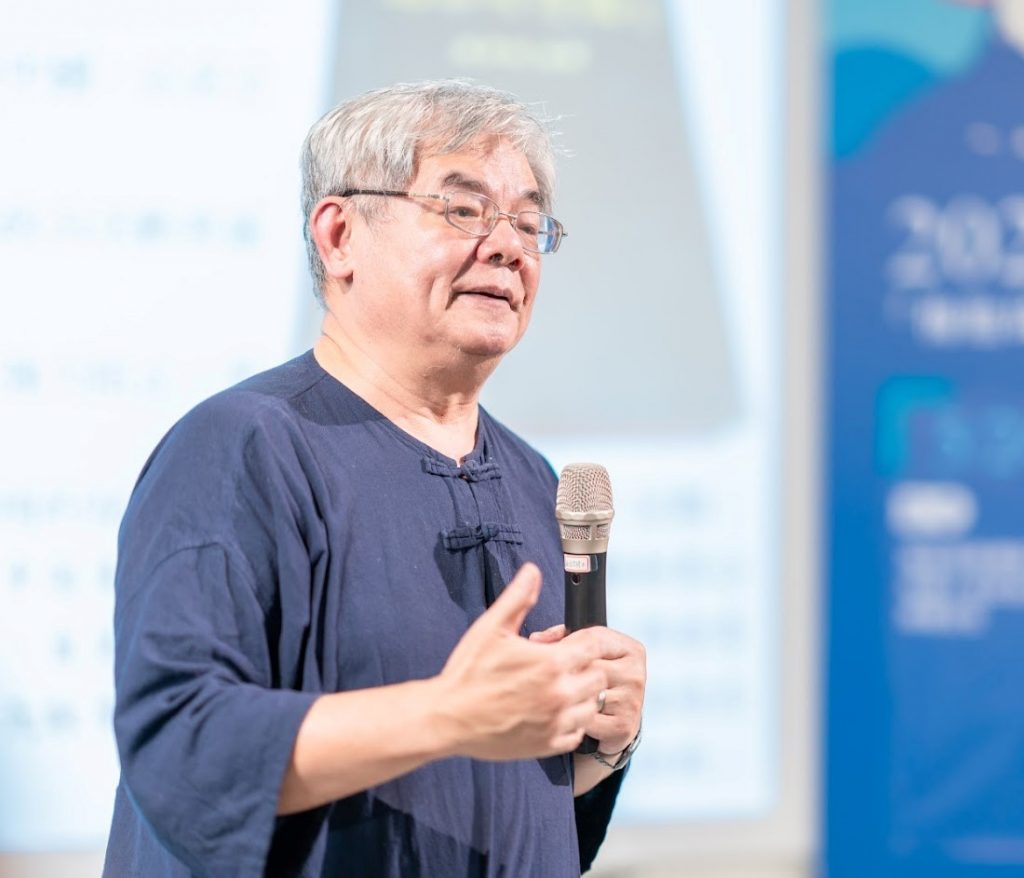楊儒賓院士講座紀要
講題:風土論與海洋儒學――對當代處境的情境主體之反思
主講人:楊儒賓(中央研究院院士暨清大哲學研究所講座教授)
時間:2024 年 10 月 24 日(四)14:20-16:20(14:00 報到入場)
地點:本校進修推廣學院1樓演講堂(臺北市大安區和平東路一段 129 號)
講者簡介:
楊教授現為國立清華大學哲學所特聘講座教授。其學術專長為宋明理學、道家哲學、身體理論、神話思想;先生屢屢在中國哲學研究領域突破舊典範,開闢新議題,引領新思潮,有聲於時。並曾為日本東京大學、九州大學及美國威斯康辛大學訪問學人。2011年11月成立臺灣中文學會,並擔任理事長。楊教授著作豐富,享譽士林;曾獲三次傑出研究獎,而《儒門內的莊子》一書更榮獲科技部人文及社會科學領域「2020最具影響力研究專書」。2024年先生榮任中央研究院院士。

演講內容提要:
台灣位處東亞大陸的一塊島嶼,
撰稿人:本系碩士生黃榮毅
本次院士系列講座的主題是「風土論與海洋儒學──對當代處境的情境主體之反思」,主講人為國立清華大學哲學研究所特聘講座教授楊儒賓先生。楊院士為國立臺灣大學文學碩士、文學博士,現任國立清華大學哲學系教授,並在2024年榮任中央研究院院士。楊院士的主要研究領域為宋明理學、身體理論與神話思想。楊院士著作豐富,成就斐然,曾於1995、1998、2004年三次榮獲國家科學委員會傑出研究獎,2017 年又獲科技部傑出特約研究員獎。代表著作有《儒家身體觀》、《異議的意義:近世東亞的反理學思潮》、《儒門內的莊子》、《1949禮讚》、《思考中華民國》等書。2011年11月成立臺灣中文學會,並擔任理事長。
在這次演講中,楊院士一開始引用馬克思在〈路易・波拿巴的霧月十八日〉中的一段話:「人們自己創造自己的歷史,但他們並非隨心所意創造,歷史並不在自己選定的條件下創造,而是直接碰到的、既定的、從過去承接下來的條件下創造。」從而說明歷史脈絡是政治實踐的必要條件;對於一個成熟的人來說,他的思考不能忽略歷史脈絡。若要談主權,就必須要考慮歷史脈絡,如果忽略歷史脈絡來談事情,就顯得論述並不嚴謹。臺灣現在的處境無法脫離1949年國民政府撤退來臺的動盪,這種歷史的動盪是牽扯兩岸一個重要因素,而中華民國撤退帶給臺灣的影響,不只有負面的,也有正面的:例如國府撤退來台,也帶來故宮博物院、中央研究院、國家圖書館等等,使得中華文化在臺灣得以延續下來,這些都是無法否認的。當然,中華民國不可否認也帶來負面的影響,只是這些負面影響或許也可以挖掘出正面的意義,而臺灣所繼承的中華民國身分即是歷史承接下來的必要條件,它既是歷史的饋贈,也是命運的共業。共業如果往好的方向發展,可以是兩岸共同的志業;反之,往不好的方向發展,則會變成兩岸共同的業力、災難。
楊院士認為在臺灣,無論是哪個政黨執政,我們都很難擺脫地緣政治的影響,譬如我們很難脫離美國的影響,這是受國際局勢的影響所致。但我們與中國之間有著另一種地緣政治,兩岸的語言、情感、歷史等種種的連結,才應該是真正的「地緣」關係;從這樣的關係出發,進一步地說,地緣政治就是一個地理區域內存的歷史、情感等連結,也可稱為「風土的地緣政治」。
其次,風土的地緣政治是與我們確切相關的,若用風土的地緣政治來看,可以發現衝突的雙方往往關係最為密切,例如:烏克蘭與俄羅斯,擁有同樣宗教、語言的兩個「族群」,居然會走到兵火相交的地步,也是很悲哀的一件事;另一個最有可能發生衝突且雙方關係密切的,就是兩岸。和辻哲郎曾說:「地緣政治學與其說是國土學,不如說是領土政策,更接近殖民政策。」地緣政治學下的國際關係多為權力鬥爭的關係,不會有個人情感在內,美中關係亦是如此。但臺灣與中國恰好不能用權力地緣政治學的框架定位,文化的臺灣固然難以分割兩岸,政治的臺灣也難以分裂兩岸;現在臺灣的主權是1949年後的中華民國,而1949年之後的中華民國與1949年之前的中華民國是相連的,所以中華民國在法理上有橫跨兩岸的主權擁有者的性格。
若從臺灣進而思考兩岸問題,可分別運用三位學者的論述。首先是曹永和的「臺灣島史觀」,曹永和先生認為臺灣島是承載臺灣歷史的托體,臺灣與其他中國省分不同之處在於臺灣島是一座近代性的島嶼,而島上的歷史是斷裂的,沒有一個主體性存在,因此思考臺灣必須以臺灣島為主體,所有島上歷史都是「臺灣歷史」的養分和內涵。楊院士則認為提出臺灣島史觀後,問題也隨之出現,若以臺灣島為史觀,那就會與「本土」的概念有所衝突。當從本土討論到主權,兩者之間的界線就非常靠近與模糊,從本土到領土與主權,恐怕無法用一條線來說明;細究之下,我們或許可發現其中曲折之處。這中間涉及從家鄉的概念躍升到國家與國體的概念,曹先生沒有解決這個問題。
第二,洪耀勳的「臺灣風土論」,不只講自然的風土,更談及文化的傳承,主要論述以根源性的領會、成立共同的生活世界,以及風土與文化的辯證。楊院士提到洪先生寫臺灣風土論時,將黑格爾的精神現象學架構與臺灣風土性結合,也將京都學派所重視的「場」的概念結合。風土文化論比起臺灣島史觀,臺灣的精神性增多,臺灣意識的哲學內涵也豐富許多,但臺灣意識的提升和臺灣的政治抉擇,雙方的連結仍然不夠清晰。
第三,蔣年豐的「海洋儒學說」。楊院士認為他的說法明確地切入兩岸問題的解決方式,擁有很強的政治性。蔣教授認為民主進步黨的成立是要轉化臺灣的意義,轉化臺灣的意義就是要轉化中國。臺灣和中國之間其實很難切割關係,關鍵在於讓臺灣如何在這個時代完成轉型,改變臺灣的現狀,連帶改變中國的現狀。其中,臺灣的現代化與民主化,是非常重要的一環,海洋儒學的概念則因運而生。臺灣的儒學也是1949年撤退後才開始蓬勃發展,包括跟著來臺的胡適、傅斯年、錢穆、牟宗三、于右任等,他們對於傳統文化有很深的感情與同情,而他們又都反對共產主義所代表的現代性,所以如何代表現代中國,儒學與傳統文化的傳承才能代表中國,中國的現代性也內在於中國歷史本身。海洋儒學的核心因素在於,1949年國民黨撤退渡海所帶來的文化,不過值得注意的是,三百年前明鄭入臺開始就已經具有海洋儒學的意義,當中就有中國的因素、有儒學的因素,連結儒家、傳統和現代。這與前面所提的「臺灣島史觀」、「臺灣風土論」並沒有衝突,而且比前兩項論述更具有「方向感」。回到中華的出發點思考,臺灣未必沒有優勢,在臺灣的中華民國因為同時繼承兩岸不同歷史脈絡的文化資源,同樣走中西混合現代化的途徑,它在詮釋中華文明發展的議題上,未必不能提供不同於共產黨的現代化方案。
最後,楊院士說到中國可以失敗一次、美國可以失敗一次,但臺灣這塊土地經不起一次失敗,臺灣只要失敗一次就沒有臺灣。所以要做任何選擇之前,都應該深思熟慮,也許各種可能的方案都該提出來思考,臺獨、華獨、中共模式的一國兩制,中華民國憲法模式的一國兩區、聯省自治、邦聯、聯邦、一國兩憲、一國兩府等。從這可以隱隱約約看出臺灣最好的發展方式,是在一個中華的架構底下;但我們要參與對中華架構的解釋,我們要掌握解釋權,我們要參與在內。兩岸關係可能的方案可以確定不會少,但真正可行的方案可能不會那麼多。這個最後攤牌前的作業似乎該好好地想一想,公民應透過商議,形成共識。
撰稿人:本系碩士生王信傑
A Theory of Fudo and Oceanic Confucianism: Reflections on Taiwan’s Contemporary Situation
The ongoing tension between China and Taiwan remains a pressing issue, yet much of the scholarly focus tends to center on its outcomes rather than its root causes. Professor Rur-Bin Yang, a leading intellectual historian with a Ph.D. from National Taiwan University, takes a different approach. Drawing on historical context and the Fudo theory of Watsuji Tetsuro, Professor Yang offers a nuanced analysis of the tensions, bringing fresh insights into Taiwan’s distinct historical trajectory.
Taiwan Island History and the Theory of Fudo
The foundational concept of Taiwan Island history, as developed by Yung-Ho Tsao, provides a critical framework for understanding Taiwan’s unique historical development. Unlike China’s relatively continuous and unified historical narrative, Taiwan’s history is characterized by fragmentation and diversity. Tsao’s theory suggests that scholars should analyze Taiwan’s past from the perspectives of its people and the geographical and cultural context of the island itself, rather than focusing exclusively on political events. This localized approach offers a richer understanding of Taiwan’s evolving social and political authority, shedding light on the complexities of its contemporary identity.
Complementing this is the theory of Fudo, which merges Hegelian dialectics with localized environmental and cultural perspectives. This theory explores how climate and geography shape human activity, culture, and national identity. By integrating Taiwan Island history with the theory of Fudo, scholars can uncover deeper connections between Taiwan’s environment, historical development, and its modern sociopolitical landscape. Together, these theories form a robust foundation for understanding Taiwan’s history as a distinct and evolving narrative.
Oceanic Confucianism: A Unique Philosophical Tradition
Adding to these frameworks, Professor Yang introduces the concept of Oceanic Confucianism, a branch of Confucian thought that evolved outside mainland China, particularly in Taiwan. First articulated by Nianfeng Chiang, Oceanic Confucianism traces its roots to democratic ideas that emerged during the late Ming Dynasty. These ideas continued to develop and were further refined in Taiwan’s unique cultural and intellectual context.
Oceanic Confucianism reflects Taiwan’s maritime culture and its openness to external influences, distinguishing it from traditional Confucianism rooted in the agrarian traditions of mainland China. Over time, it has become a defining element of Taiwan’s intellectual history, embodying values such as pluralism, adaptability, and democratic thought. Professor Yang argues that Oceanic Confucianism not only complements Taiwan Island history and the theory of clime but also serves as a philosophical lens for understanding Taiwan’s modern identity. It underscores the island’s capacity to synthesize diverse influences while maintaining a distinct cultural identity.
Toward a Nuanced Understanding of Taiwan’s Historical and Intellectual Identity
Professor Yang’s work demonstrates that a special intellectual interpretation built upon the interplay of Taiwan Island history, the theory of Fudo, and Oceanic Confucianism. These frameworks highlight Taiwan’s distinctiveness from China and other parts of the world, offering a comprehensive approach to analyzing its current situation. Yang’s perspective challenges the tendency to view Taiwan solely through the lens of political events, advocating instead for a broader and more integrative understanding. By analyzing Taiwan’s history through these theories, Professor Yang emphasizes the importance of contextualizing Taiwan’s present tensions within its unique historical and cultural development.
Conclusion: A Framework for Resolution and Reconciliation
Professor Yang’s integrative approach offers valuable tools for addressing the ongoing China-Taiwan crisis. By situating the conflict within Taiwan’s unique historical and intellectual frameworks, he encourages a shift away from viewing the situation as merely a geopolitical issue. Instead, he advocates for understanding it as the culmination of Taiwan’s historical, environmental, and philosophical evolution.
This perspective not only enriches the academic study of Taiwan but also provides a pathway for fostering dialogue and reconciliation. As scholars and policymakers alike continue to grapple with the complexities of the China-Taiwan relationship, Professor Yang’s work stands as a vital contribution, reminding us of the importance of understanding history, geography, and philosophy as interconnected forces shaping the present and future. His lecture organized by the History Department at NTNU drew over 100 scholars and students and sparked significant interest in applying these theories to future research on Taiwan’s history. Participants lauded his ability to merge theoretical rigor with practical relevance, making his work an important contribution for studies on Taiwan’s intellectual and political identity.